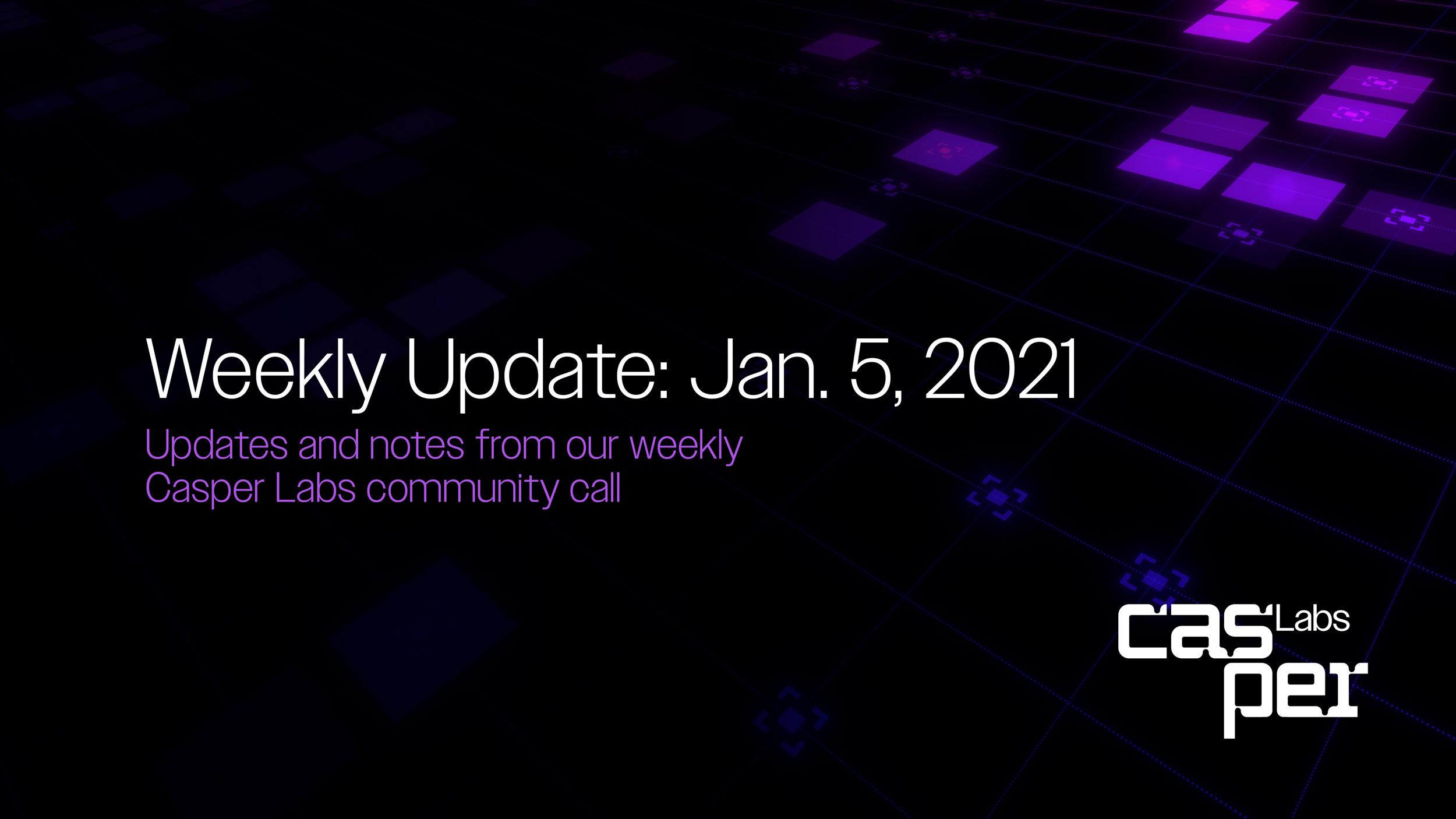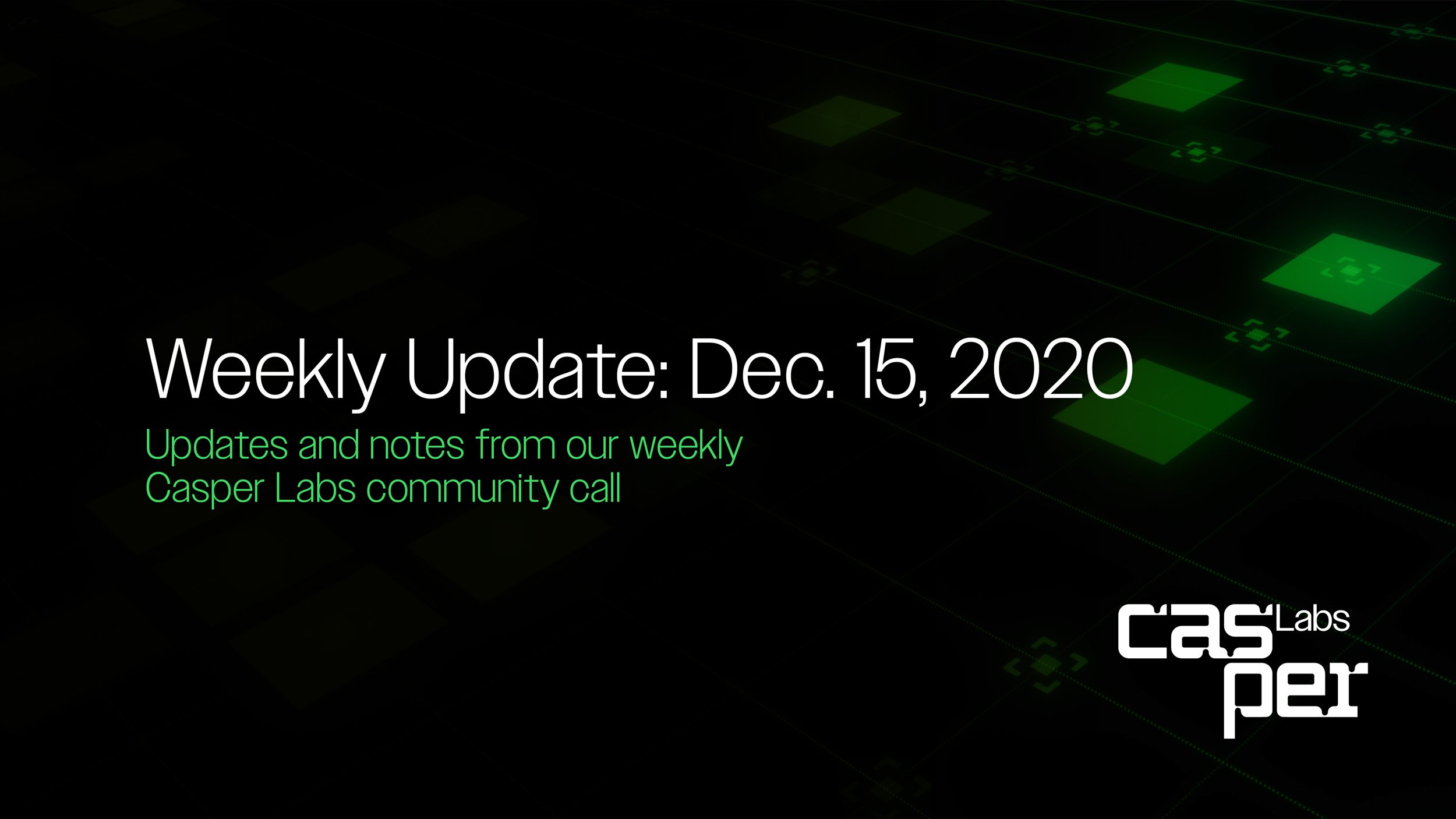Update Summary
We’re implementing finality signatures on Highway to enhance the security of the network. We’re upgrading the specification for the gas spot market to facilitate partial reimbursements for unused gas. Immediately after mainnet launch, we’ll be working on the gas futures specification and researching sharding immediately.
We’ve had an amazing year at CasperLabs. Even during the pandemic, we have made substantial progress and giant strides. In case you missed it, we published a blog post looking back at the key highlights in 2020 at CasperLabs. We believe 2021 holds more exciting promises for us and the crypto sphere at large, and we look forward to it.
Merry Christmas, Happy Holidays, and a Happy New Year!
Execution
- The team has started the third weekly sprint of the 21.01 release cycle (Sprint 9.3). Release 21.01 marks the first production version (Mainnet Release Candidate) of the Casper protocol.
- This release will improve networking by providing a robust node discovery and gossiping protocol to support message passing and node discovery for the Casper network. The protocol will also complete the integration with a custody provider during this release cycle.
Delta Testnet
- Delta Testnet is up with 4 Validators. Current block height: 1404, Era Id: 50.
- We are targeting to open and add more validators starting Wednesday.
- For validators that took part in the Alpha and/or Beta testnet, please complete the KYC process to receive your VFTA. You received an email recently from us with the required information.
Current Focus
Highway
- Implementation of Finality Signatures. This improves the trust and security of the network.
- Disabling bids on liveness failures. This disables bids from offline validators from participating in consensus to prevent liveness failures.
- Network hardening: designing crash recovery methods for the network.
- We’ve finished the Highway paper! The plan is to submit to arxiv.org & start the peer review process.
Node — Rust
- We’re removing account hashes from the node discovery service, as it creates confusion for node runners. We will now represent accounts internally using the public key with the two leading characters of the public key representing the encryption scheme. For example, if the key starts with “01”, it’s an ED25519 key, “02” an SEC-P256K1 (Ethereum/Bitcoin type key), etc. We also plan on supporting SEC_P256R1 keys post mainnet.
- Implement network discovery via Kademlia.
- Update libp2p gossip and direct-message behavior.
- Merkle proof key enumeration prototype. This is research on Fast-Sync that we’re working on to support protocol hard forks.
- Fix event size and potentially re-introduce compile-time enforced upper limit.
- Check account when submitting deploys. Because of the turning complete nature of the payment code on the Casper network, when a deploy is submitted from an account, the account that signs the transaction effectively acts as a guarantor so if a malicious payment code was submitted to the network and the publishing account does not have enough funds to cover for it, the protocol will reach out to the account that signed the transaction and deduct fees/charges from it.
Test and SRE
- Enable RDS Performance Insights for event-store.
- STests: Extend workload generators.
- Create Python scripts for EC2 provisioning.
- Improving CI/CD — Add crates.io publish to tag pipeline.
Ecosystem
- JavaScript SDK. We’re finishing the JavaScript SDK and seeding it with new keys.
- CLarity and Event Store: We’re enabling automated testing for the CLarity via cypress tests.
Economics Research
- Improve the gas spot market specification.
- Create auction CEPs.
Team & Company Update
Our weekly Governance/Community call holds every Tuesday
Time: 9:00 AM PST (16:00 UTC, Sydney +11, Beijing +8, Greece +3, Amsterdam +2, Onitsha +1, New York -4, Seattle -7)
Our weekly workshops/dApp Session holds twice a week on: Thursdays 07:00 am Pacific time and Fridays, midnight Pacific (4 pm Japanese Time).
Want to get started?
At release, links to installation packages and relevant documentation are available on GitHub.
- Packages available on GitHub
- DApp Developer Guide
Where can bugs be reported?
- Report a bug on GitHub


